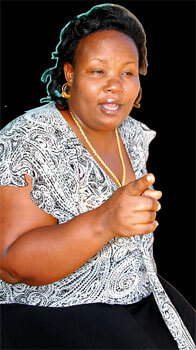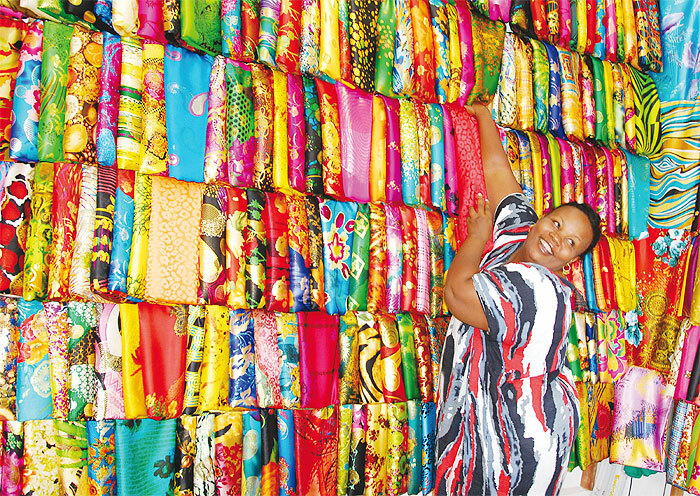The orphan housemaid who dared to dream big
The first thing that pops in our heads when someone mentions the name Maama Fina (real name Sylvia Namutebi) is “witchdoctor.”
The first thing that pops in our heads when someone mentions the name Maama Fina (real name Sylvia Namutebi) is “witchdoctor.”
But what many of us do not know is that mysticism is only a small part of Maama Fina; a stepping stone to social prominence, to pave way for her real passion — business.
Micheal Kinaabi and Sebidde Kiryowa sound her out on her tough and strenuous journey from abject poverty to abundance
Humble beginning
Tell us briefly about your background
I was born 38 years ago in Mukono Kyagwe. Both my parents are deceased. I dropped out of school in P2 when my mother was exiled to a far-flung village after she was suspected of supporting rebels. She died from there.
At only 12 years of age, I was left with my one-year-old brother in Mabira forest, where my late mother had bought land and it is then that it dawned on me that I had to fend for my brother and myself. I started digging to provide food for us. I supplemented that with odd jobs in the village.
How did you end up in Kampala and what was your first job in town?  A certain man called Byakatonda came to our village from Kampala looking for a housemaid, everyone recommended me because I was hardworking and an orphan. He brought me to Kampala in 1991, promising to pay me sh400 per month.
A certain man called Byakatonda came to our village from Kampala looking for a housemaid, everyone recommended me because I was hardworking and an orphan. He brought me to Kampala in 1991, promising to pay me sh400 per month.
However, six months passed without me receiving a cent from him. He soon fired me for giving a cluster of matooke to hungry neighbours.
I was later taken on by Princess Nakayenga, who had sympathised with me. I worked for her in Bugolobi flats before she later took me to work for her mother on Salaama Road.
She took me to school, but I could not cope because I was already mature and hardly knew English. So I requested her to let me focus on work, to which she agreed.
The unlikely journey into business
That all seems too far-flung from the businesswoman you later became. How did your journey into business begin?
The process began when my mistress doubled my salary to sh3,000.
After the first payment, I requested her to hold my salary for the next three months. It accumulated to sh9,000, the highest amount of money I had ever held. I went back to the village to see my people and that is the time I started practising traditional medicine.
I later came back to town — this time determined not to work as a housemaid. Armed with sh9,500, I set out to vend katogo (a mixture of matooke and offal (byenda) for breakfast in Kisenyi, a slum on the periphery of Kampala.
In 1994, business was slow, so I moved in with my brother, who lived in Kirombe Zone, Kaliga, Ndeeba, a Kampala suburb. I thought he was doing well in the city because of his showy lifestyle. But when I moved in with him, I was shocked to find out that he lived in a mud-and-wattle shack.
A Hajjat had allocated him space on her premises to erect the shack using mud and elephant grass fastened with sisal strings. The rent was sh500 per month.
My brother would jump onto trucks that brought matooke into Ndeeba market. In the process, he would pluck some bananas off the bunches.
He would gather them into small heaps (myeera) and peddle them along the railway line in Ndeeba for a living. That’s how we survived; that’s how he earned his living.
While at his place, I earned my upkeep by washing clothes for people in the neighbourhood. However, these people were as desperate as I was, so I tried out traditional spiritual healing to better their lives. I became more popular for the traditional healing than the washing, thus the origin of the phrase, “Maama Fina mu Ndeeba”.
Was it from practising traditional spiritual healing that you got the capital to set up a serious business?
That’s a major misconception that people have. I never practised traditional spiritual healing for money.
It’s more like a calling; an anointing by my ancestors, not a job. In fact, any person who practises traditional spiritual healing solely for money is a quack. You have to have a business or job.
I practise traditional spiritual healing to help people prosper, not bring harm to anyone. That’s why I don’t understand why anyone would call it “evil”. As a reward, I believe the spirits have cleared my path to success, bestowing blessings on me for the good job I’m doing.
No one has ever paid me a sh1m to “cure” them.
I get tips in appreciation from people who feel I have helped solve their problems. There’s no way anyone can get rich from money taken from people, who are ailing. It’s cursed money and I can never use it in my businesses.
Just so you know, I have been “seeing patients” on the side for 20 years now and I only do it on Sunday. I “see” up to 150 “patients” on any given Sunday and I wouldn’t take time off to see anyone else on any other day because I have businesses to run.
So, how did you get the money to start you off in serious business?
There was a girl called Anita who had a boyfriend abroad. She sold buveera (polythene bags) in a shop called Nansagazi near Mini Price on Ben Kiwanuka Street in Kampala. For a long time, she attempted to join her boyfriend, but failed to secure a visa. I tried to secure a visa with her and fortunately, with God’s will, she succeeded. 
In one of her garment shops in Mityana
As a way of appreciating my efforts, she left her business to me on condition that I would look after her child. However, most buyers did not make it to the shop.
They bought buveera from vendors by the roadside and from those in the taxi park, who incidentally would buy from us. So, I started taking the polythene bags to the taxi parks. I made some good money.
Getting into import business
How did you move from vending buveera in the taxi park into the lucrative import business?
While at Mini Price, a woman who imported children’s clothes from Nairobi came to our shop and told me how Ugandans were making a killing from the trade.
I listened intently and asked her how much capital I required. She told me I needed at least sh450,000 to cover my return bus ticket, food and accommodation and remain with enough to shop.
I had sh280,000, my entire savings at the time, but I took my chances with it. I boarded a bus to Nairobi, slept in some of the cheapest places and ate the cheapest food, but returned with clothes. I spent sh40,000 on the trip and I brought clothes worth sh240,000, which
I sold and made sh570,000.
I went back and brought more clothes and by 1995, I had accumulated over sh2m in capital. I later moved into importation of cotton fabric (jolla), which I would sell to schools and other traders.
The same year, I bought my first car, a Toyota Hiace (kigege) at sh3.5m to ease the transportation of my products.
First shop
In 1997, I diversified from jolla into importing gomesi fabrics. In the same year, I opened my first shop on Luwum Street. I called it Banamasaka Garments. We dealt exclusively in garments. I was later told I could make much more money if I went to Dubai and bought the gomesi fabrics myself.
In September 1998, I made $5,000 (sh12m now) on my first trip to Dubai. In 1999, I started going to Guangzhou in China. It is during that time that I opened Mama Fina garments shops, which have since grown to six big shops in the central business district of Kampala and one in Mityana town.
To date, my importation business has grown tremendously. I now import merchandise worth over sh1b every month, which include regular clothes, suits for women, shoes, bed covers, accessories and cars.
When it comes to importation of women’s garments, I am only rivalled by one woman in town I think — Hajat Nuru Mpungu.